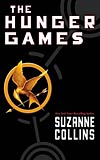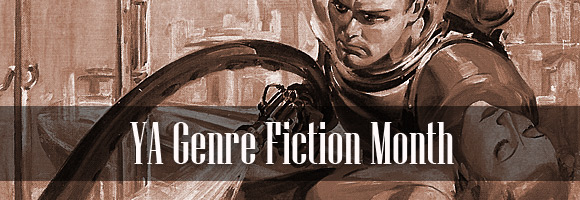YA Genre Fiction Month: End of Month Wrap-Up
“If you go back even 15 years there was definitely a tendency at that point to go from kids’ books to adult books. The idea that people would be writing books aimed primarily at a teen audience is really cool and really new, and the idea of YA books being genre books is, again, cool and new.” –Neil Gaiman (from the Spinoff Online blog)
 The young adult literature movement is a newcomer in the history of literature, and only time will tell if it is one that will remain a permanent fixture into the future. While its popularity is certainly on the rise, as the shelf-space allotment in any bookstore will prove, is YA a movement with legs or is it just a fad? Even Wikipedia can’t solidly trace its history earlier than the twentieth century.
The young adult literature movement is a newcomer in the history of literature, and only time will tell if it is one that will remain a permanent fixture into the future. While its popularity is certainly on the rise, as the shelf-space allotment in any bookstore will prove, is YA a movement with legs or is it just a fad? Even Wikipedia can’t solidly trace its history earlier than the twentieth century.
I expect that the popularity of art aimed at young adults depends a great deal on how much the adolescent generation identifies itself with older generations, how strongly it either looks forward to assimilation into the world of adulthood or else seeks to form its own separate identity. Our time seems to be clearly one where the young desires separation more than assimilation, today as much as the revolutionary sixties. They want their own music, their own television programs, and their own fiction.
 As with any youth-driven movement, YA fiction is full of energy, expectation and anxiety: Ender’s Game exposes the often confusing and unfair relationship between children and adults, The Hobbit encourages even “little people” to be open to the call to adventure, and Harry Potter is a study of what happens to children of whom much is expected but who receive far too little support from their elders. Much of YA fiction is straight-up adventure fiction written at the appropriate age-level, often enough with adult protagonists. It’s becoming more popular, however, to populate YA books with young adult characters—an inevitable evolution, I suppose. The fictional dream becomes stronger the more the reader is able to identify with its characters. The books nominated in the Locus YA Award bear out this observation, and that list contrasts quite sharply with David Brin’s list of books with mostly-adult protagonists.
As with any youth-driven movement, YA fiction is full of energy, expectation and anxiety: Ender’s Game exposes the often confusing and unfair relationship between children and adults, The Hobbit encourages even “little people” to be open to the call to adventure, and Harry Potter is a study of what happens to children of whom much is expected but who receive far too little support from their elders. Much of YA fiction is straight-up adventure fiction written at the appropriate age-level, often enough with adult protagonists. It’s becoming more popular, however, to populate YA books with young adult characters—an inevitable evolution, I suppose. The fictional dream becomes stronger the more the reader is able to identify with its characters. The books nominated in the Locus YA Award bear out this observation, and that list contrasts quite sharply with David Brin’s list of books with mostly-adult protagonists.
 What does the future hold for the young adult literature movement? The almost absurd popularity of book series like Stephenie Meyer’s Twilight and Suzanne Collins’ The Hunger Games ensures, at the very least, a continued exploitation of this market until trends move in some other direction. The existence of a YA market, though, is not (I think) as stable or certain as the children’s and adult markets. I expect it to remain popular for decades to come, but only time will tell.
What does the future hold for the young adult literature movement? The almost absurd popularity of book series like Stephenie Meyer’s Twilight and Suzanne Collins’ The Hunger Games ensures, at the very least, a continued exploitation of this market until trends move in some other direction. The existence of a YA market, though, is not (I think) as stable or certain as the children’s and adult markets. I expect it to remain popular for decades to come, but only time will tell.



















 Full Details
Full Details



1 Comment
Thanks for a very interesting series. My only concern with material like "Twilight" is the stigma that may develop from its over popularisation for the YA segment. Did "adult SF" not suffer the "escapism" stigma with the earlier pulps? The quality of both the writing and chosen subject matter leaves a lot to be desired for. If one considers "Little Brother" and other contemporaries, then I think YA has a definitive future in cultivating young minds to think outside the box of traditional boundaries. I doubt that the "new pulp" of YA, such as "Twilight" and to some extend even Harry Potter, will necessarily draw new fans to true SF – or at the very least, pull just a few along. The rest, sadly, will probably remain fixated with the romanticised teen pulp. The novels you’ve review were a breed apart! (I wonder how many "Twilight" fans actually read The Hobbit or Foundation.)
Sorry, the comment form is closed at this time.